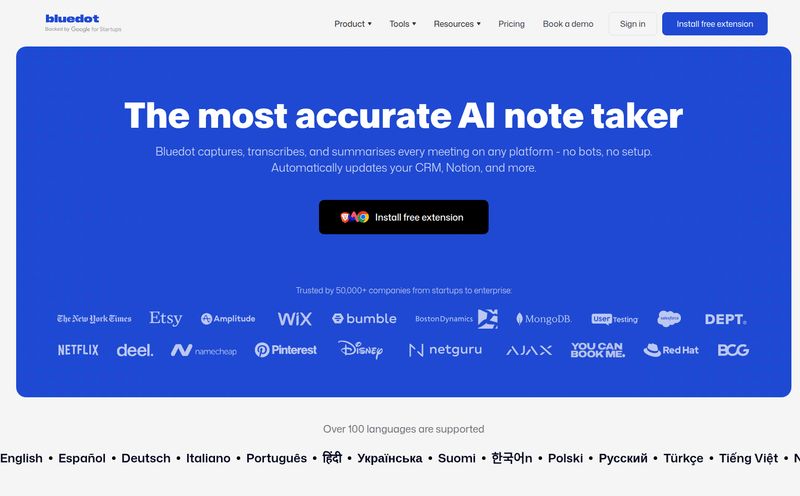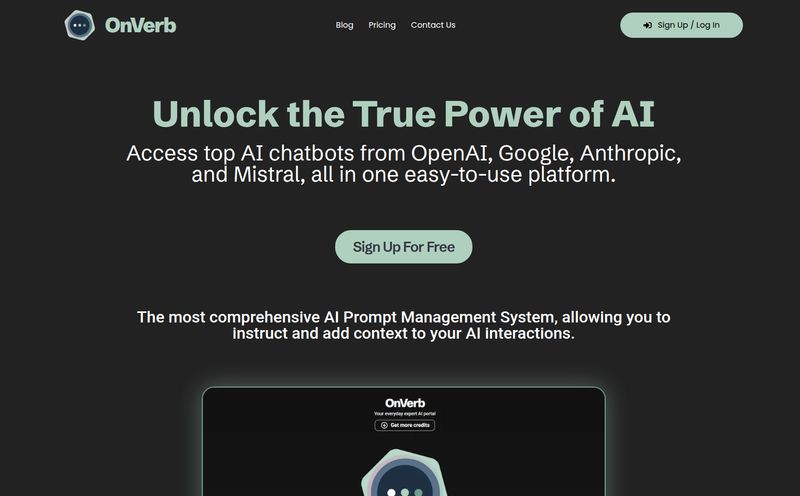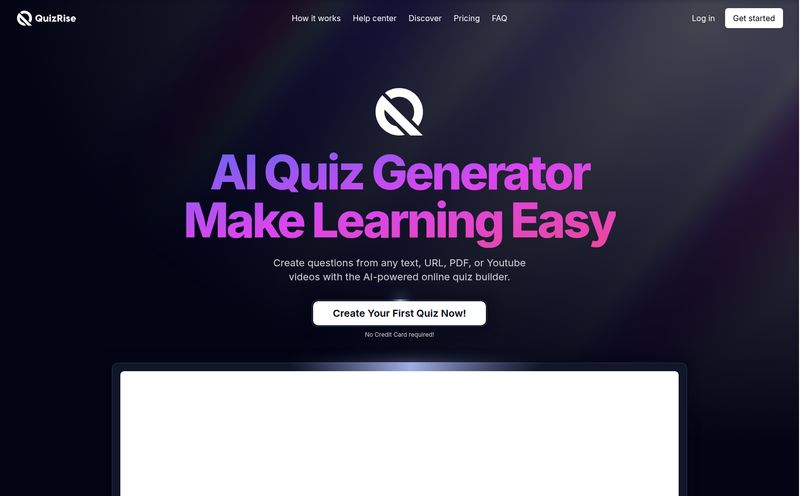My 'to-read' pile is less of a pile and more of a structurally unsound mountain range threatening to collapse and bury me alive. I bet yours is too. Between new releases, classics I've always meant to read, and those business books my boss keeps mentioning, there just aren't enough hours in the day. It's the classic bookworm's dilemma.
So, when I stumbled upon a tool called booksummary.ai, my interest was piqued. An AI that reads books and gives you the highlights? It sounds like something straight out of science fiction. Part of me, the grizzled SEO guy who's seen a million 'game-changing' AI tools come and go, was deeply skeptical. But the other part, the guy with a Kindle library full of unread purchases, was hopeful. Could this actually work?
So, What is booksummary.ai Anyway?
At its core, booksummary.ai is exactly what it says on the tin. It's a platform that uses artificial intelligence to generate summaries of books. It’s built on OpenAI's GPT-3 technology—yep, the same family of brainpower behind the tools that are writing code, creating images, and generally taking over our feeds. The goal here is simple: to provide quick, digestible summaries for educational and informational purposes.
Think of it as having a super-fast, slightly nerdy robot librarian who has read everything and is more than happy to give you the tl;dr before you commit to a 500-page epic. It's designed to give you the skeleton of a book's argument or plot, saving you precious, precious time.

Visit booksummary.ai
First Impressions: A Look at the User Experience
When you first land on the site, it's... a lot. You’re greeted with a massive grid of what looks like book titles and a dizzying array of tags and categories. From 'Sci-Fi' and 'Suspense' to more niche topics, the variety is impressive. It feels a bit like a digital library index, which I guess is the point. For someone who knows what they're looking for, it's probably great. For a casual browser, it might feel a little overwhelming.
Each potential summary has a 'Loading...' state, which tells me these summaries are likely generated on-demand. That's a smart way to manage server costs, but it also means you might have a short wait. It’s not instant coffee, more like a quick pour-over. You gotta give the AI a second to do its thing.
The Good, The Bad, and The AI
Like any tool, especially an AI one, it's not all sunshine and literary roses. After playing around with the concept, there are some clear wins and some definite watch-outs.
The Upside: A Serious Time-Saver
The most obvious advantage is speed. Being able to get the main takeaways from a dense non-fiction book like Sapiens or a complex novel in just a few minutes is a superpower. I've always felt this is where AI can really shine. It’s not about replacing human effort, but augmenting it. You can use it to quickly vet if a book is worth your time, refresh your memory on a book you read years ago, or get a basic understanding of a topic outside your expertise for a meeting. It's an incredible tool for discovery and for learning efficiency.
The Downside: You Lose the Soul of the Story
But here's the thing you have to accept: a summary is not the book. You lose all the nuance, the author's carefully crafted prose, the emotional journey of the characters, the subtle foreshadowing... you lose the art. Reading a summary of To Kill a Mockingbird won't make you feel the injustice and warmth that Harper Lee so brilliantly wove into her narrative. It's the difference between seeing a postcard of the Grand Canyon and actually standing on the rim, feeling the wind and the sheer scale of it all. This tool gives you the facts, but it strips out the soul.
The AI Factor: Trust but Verify
And then there's the AI itself. GPT-3 is powerful, but it's not perfect. It's trained on a massive dataset from the internet, and it can sometimes misunderstand context, miss key subtleties, or even 'hallucinate' details that weren't in the original text. I’ve seen it happen with other GPT-based tools. So, you can’t take these summaries as gospel. They are a starting point, a guide, but not an infallible source of truth.
The Elephant in the Room: Copyright and Ethics
Okay, we have to talk about this. The copyright implications of AI-generated content are a massive, messy legal gray area that folks much smarter than me are trying to figure out. Is generating a summary of a copyrighted work 'fair use'? The platform itself states the summaries are for educational and private use, which is a nod to this very issue.
My personal take? If you're using it to decide whether to buy the book, you're probably fine. If a student is using it to understand a concept before writing their own original paper, that seems like a valid educational use. But if you're just copying and pasting these summaries and passing them off as your own analysis... well, that's just old-fashioned plagiarism with a high-tech coat of paint. It’s a tool, and like any tool, it can be used for good or for not-so-good. The responsibility, as always, lies with the user.
Is booksummary.ai Free to Use?
As of my review, there's no pricing page or any mention of a cost. This is pretty common for new AI platforms hitting the market—they often launch for free to build a user base and gather feedback before introducing subscription tiers. So for now, it seems you can use booksummary.ai without opening your wallet. My advice? Take advantage of it while you can, because that could always change down the road.
So, Who Is This Really For?
After thinking about it, I've landed on a few ideal users for a tool like this:
- The Busy Professional: Needs to get the key insights from the latest business bestsellers but doesn't have 10 hours to read them all.
- The Diligent Student: Wants a high-level overview of a text to supplement their own reading and revision, not replace it.
- The Curious Mind: Wants to explore a wide range of topics and authors to build a more curated and interesting 'to-read' list.
- The Forgetful Reader: Someone like me who reads a book and, six months later, can only remember the vague plot points. A quick summary is the perfect refresher.
It's not for the literary purist who reads for the beauty of the language, or for someone looking for a shortcut to an A+ without doing the work. It's a supplement, not a substitute.
Frequently Asked Questions (FAQ)
Is booksummary.ai free?
Currently, yes. The platform doesn't list any pricing or subscription plans, so it appears to be free to use at the moment.
Can I use these summaries for my school paper?
You should be very careful. It's a great tool for getting a preliminary understanding of a book's themes and plot. However, you should never cite the summary directly or copy its text. Always read the original source and form your own arguments. Think of it as advanced CliffsNotes—a study aid, not a source.
How accurate are the AI summaries?
They are generally quite good at capturing the main points and plot, but they aren't flawless. Because they rely on GPT-3, they can sometimes miss nuance or even make small errors. Always cross-reference with other sources if accuracy is critical.
Is this a replacement for reading the actual book?
Absolutely not. And I can't stress this enough. A summary gives you the information; the book gives you the experience. You miss out on the author's voice, the character development, and the emotional impact. Use it to enhance your reading life, not replace it.
What technology does booksummary.ai use?
It uses OpenAI's GPT-3, which is a large language model known for its ability to generate sophisticated, human-like text.
Are there any copyright issues?
This is a developing area of law. The service is intended for personal and educational use, which often falls under 'fair use' guidelines. However, users should be mindful of copyright and avoid using the content for commercial purposes or plagiarism.
Final Thoughts: A Tool, Not a Magic Wand
So, where do I land on booksummary.ai? I'm cautiously optimistic. It’s a genuinely useful tool that, if used correctly, can help us manage the overwhelming flood of information we face every day. It can make us more efficient learners and help us discover books we might otherwise have missed.
But it's not a magic wand that can grant you the wisdom of a library without the effort. The real magic of reading—the empathy, the wonder, the slow unfolding of a new world—can't be automated or summarized. So by all means, use this tool to get the gist. Use it to be more productive. But please, don't forget to curl up with a good book and just enjoy the journey.
Reference and Sources
booksummary.ai: https://booksummary.ai/
OpenAI's GPT-3: For more on the technology behind the tool. https://openai.com/
Fair Use in Copyright Law: A helpful overview from Stanford University Libraries. https://fairuse.stanford.edu/overview/fair-use/what-is-fair-use/



